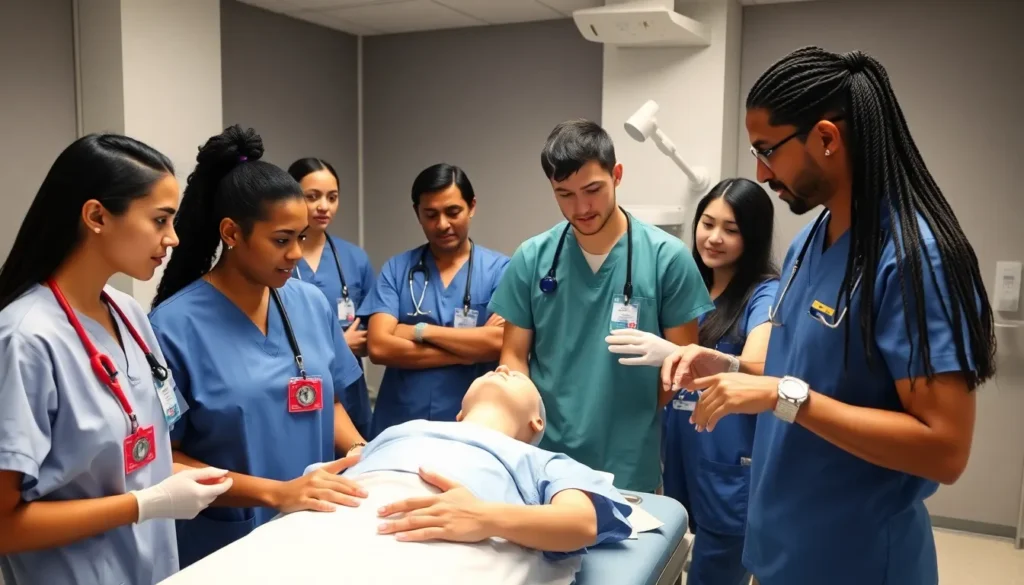Table of Contents
ToggleIn a world where healthcare is evolving faster than a cat meme goes viral, nurse education stands at the forefront of this transformation. Today’s aspiring nurses aren’t just memorizing anatomy; they’re mastering technology, critical thinking, and compassion—often all before their morning coffee kicks in.
Overview Of Nurse Education Today
Nurse education has undergone significant changes in response to evolving healthcare needs. Modern curricula integrate advanced technology and emphasize critical thinking skills. Students engage with simulations and clinical practice alongside traditional subjects like anatomy and pharmacology.
Compassion remains a key focus in nurse training programs. Understanding patient needs and emotions enhances the quality of care provided. Programs also incorporate communication skills, vital for building patient relationships.
In addition, online education options have expanded, allowing flexibility for students. Many programs offer hybrid models that combine online coursework with hands-on training in clinical environments. This flexibility accommodates diverse learner needs and promotes accessibility.
Data from the American Association of Colleges of Nursing shows an increasing number of students pursuing Bachelor of Science in Nursing degrees. In 2021, over 200,000 students enrolled in BSN programs, reflecting a shift toward higher education standards in nursing.
Nurse educators emphasize interprofessional collaboration. By working with other healthcare professionals, nursing students learn to navigate complex care environments more effectively. This teamwork prepares them for real-world challenges in healthcare settings.
Educational institutions increasingly focus on leadership and management within the nursing curriculum. Graduates emerge as well-rounded professionals capable of taking on leadership roles. This preparation is essential for addressing the multifaceted demands of modern healthcare systems.
Overall, nurse education adapts continuously, ensuring that graduates are equipped with current knowledge and skills. The commitment to educating competent, compassionate nurses underpins the ongoing advancement of healthcare.
The Importance Of Nurse Education


Nurse education plays a crucial role in shaping effective healthcare professionals. Modern curricula emphasize both clinical skills and interpersonal attributes.
Role In Patient Care
Nurses serve as the frontline of healthcare, providing direct patient care. Compassionate communication fosters a trusting relationship between patients and healthcare providers. Competence in clinical skills ensures that nurses administer medications and treatments safely. The integration of technology in education equips nurses to use electronic health records proficiently. Engaging in simulations enhances decision-making skills in realistic scenarios. Training also emphasizes critical thinking, allowing nurses to assess patient needs accurately.
Impact On Healthcare Outcomes
Improved nurse education leads to better patient outcomes. Studies show that higher educational standards correlate with lower mortality rates and fewer medical errors. Advanced practice nurses, such as nurse practitioners, play essential roles in primary care settings. By collaborating with interdisciplinary teams, nurses contribute to comprehensive treatment plans. Data from the American Association of Colleges of Nursing confirm that graduates with a Bachelor of Science in Nursing are better prepared for the complexities of modern healthcare. Enhanced nursing education ensures that professionals can effectively meet the evolving demands of patient care.
Current Trends In Nurse Education
Nurse education is adapting to meet modern demands, emphasizing innovative practices and advanced technologies. Integrating technology becomes essential in preparing future nurses for a digitally-driven healthcare environment.
Integration Of Technology
The inclusion of technology in nurse education is transformative. Nursing students learn to navigate electronic health records, utilizing software essential for patient documentation and care management. Interactive tools such as mobile applications enhance learning experiences and promote accessibility. Online education platforms offer flexibility and convenience, making it easier for students to balance work, study, and personal commitments. Immersive technologies, like virtual reality, provide hands-on experiences in a controlled setting, allowing students to refine their clinical skills without risk to patients. As these technologies evolve, nurse education is well-equipped to integrate them, ensuring graduates are proficient in using modern healthcare technologies.
Emphasis On Simulation Training
Simulation training plays a significant role in bridging theory and practice. Educators design hands-on scenarios that replicate real-life clinical situations, fostering critical thinking and decision-making skills. Students engage in simulated experiences that build their confidence in patient interactions and clinical procedures. Instructors assess students’ performance, providing immediate feedback that enhances learning outcomes. Many programs now include high-fidelity mannequins that mimic various medical conditions, allowing students to practice life-saving techniques in a safe environment. Incorporating simulation into curricula prepares nurses to handle complex situations, leading to improved patient care and outcomes in real-world settings.
Challenges Facing Nurse Education
Nurse education faces several significant challenges that impact the development of future healthcare professionals. Faculty shortages and access and equity issues pose obstacles to meeting the growing demands of the nursing profession.
Faculty Shortages
Faculty shortages severely affect nursing education programs. The American Association of Colleges of Nursing reported approximately 80,000 qualified applicants were turned away from nursing programs in 2021 due to a lack of faculty. Teaching positions often require advanced degrees, creating a barrier for many potential instructors. These shortages lead to larger class sizes, reducing individualized attention for nursing students. Moreover, experienced nurse educators are nearing retirement, further exacerbating the situation. As nursing schools struggle to maintain adequate staffing levels, the risk of insufficiently prepared graduates increases.
Access And Equity Issues
Access and equity issues impact nurse education and the diversity of the nursing workforce. Geographic barriers limit students’ opportunities to pursue nursing programs, particularly in rural areas. Online education options offer some solutions but may not fully address disparities in technology access. Financial constraints also play a role, as tuition fees and additional costs can deter prospective students from lower-income backgrounds. Furthermore, minority representation in nursing remains insufficient, highlighting the need for targeted recruitment and support programs. Enhancing access and equity promotes a more inclusive nursing workforce, ultimately benefiting patient care in diverse communities.
The Future Of Nurse Education
Nurse education continues to evolve, adapting to the needs of modern healthcare. Innovative practices shape the curriculum, preparing students for real-world challenges.
Advancements In Curriculum
Integration of advanced technology into nursing programs enhances learning. Nursing students now focus on simulation-based training, which bridges theory and practice. Many institutions incorporate interprofessional education, fostering collaboration among healthcare professionals. Curriculum changes reflect a commitment to critical thinking and compassionate care, reflecting the evolving demands of patient care. According to the American Association of Colleges of Nursing, over 200,000 students enrolled in Bachelor of Science in Nursing programs in 2021. As education standards rise, nursing programs increasingly emphasize leadership skills to prepare graduates for multifaceted healthcare environments.
Lifelong Learning For Nurses
Continuous education supports nurses in adapting to healthcare changes. Many nurses engage in specialty certifications, keeping skills current and relevant. Opportunities for professional development vary, including workshops, online courses, and conferences. Resources for further education enhance knowledge and competence, ensuring high-quality patient care. According to the Institute of Medicine, lifelong learning significantly improves healthcare outcomes. As medical practices evolve, ongoing education equips nurses to navigate complexities in care delivery effectively.
The landscape of nurse education is transforming to meet the dynamic needs of modern healthcare. By integrating technology and emphasizing critical thinking and compassion, nursing programs are preparing students for the challenges they will face in real-world settings. This evolution not only enhances the quality of care but also fosters a more competent and compassionate nursing workforce. Addressing challenges like faculty shortages and access issues will be vital in ensuring that future generations of nurses can thrive. As the profession continues to adapt, ongoing education and innovative practices will remain essential in shaping effective healthcare professionals capable of delivering exceptional patient care.







